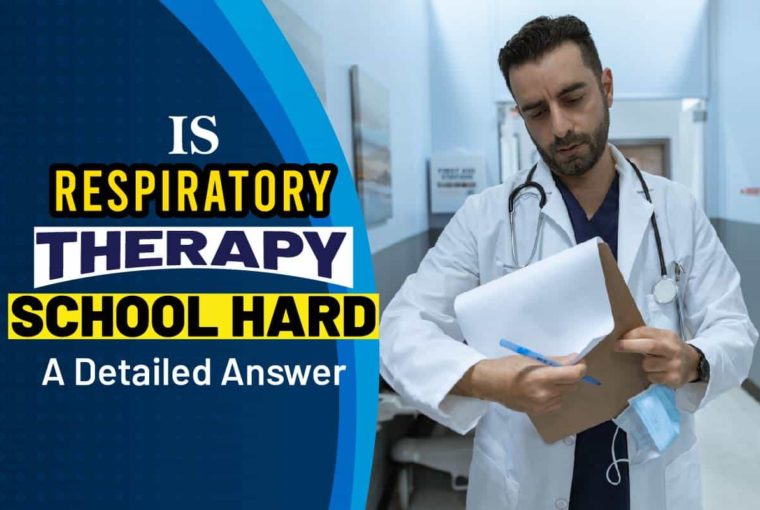Respiratory therapy is primarily designed to help people with long-standing respiratory problems – it is a life-saving occupation that accurately assesses the condition of cardiopulmonary disorders in patients.
People who study respiratory therapy will work with doctors to diagnose, evaluate and medicate people who are suffering from the problem. You need to have a proper degree to become a verified respiratory therapist.
Is Respiratory Therapy School Hard?
Well, yes, it is. It is surely harder than studying in a nursing school. RT schools wholly focus on the study of the heart and lungs – every detail is magnified and taught in-depth. Therefore, respiratory therapy study is a specialization that will keep you quite busy and glued to your books.
Respiratory Therapy Clinicals: Making It Count
Clinicals means ‘clinical rotations,’ and this is a stage of your career that will happen once you’re done with theoretical and laboratory studies. You will have to attend hospitals, stay on duty and treat actual patients.
It is important that you give your best professional performance during this period to ensure that you have employment opportunities in the future.
Let’s look at some of the things that will make you a success in your clinicals straight away.
Remember the three Cs – Courtesy, Curiosity, and Commitment.
Courtesy
Make yourself noticeable and liked. A well-behaved person is always a delight to work with. You have to show that you can handle situations like a professional while always treating people with respect.
Being courteous is an important skill for an RT specialist because you will often be in stressful situations. Keeping your mind calm and maintaining professional decency in trying times will help the patients, their loved ones, and also fellow practitioners to have more faith in you.
Curiosity
Being curious indicates that you’re attentive and diligent in your task. If you ask a lot of good questions, the doctors training you will definitely like having a discussion with you. You will learn a lot from them and also get on their good books at the same time.
Commitment
You have to commit in order to climb the ladder in this field. Make sure that you are never late. In fact, if you show up a little early, you will definitely get brownie points. The second part of commitment is that you keep improving your skills, and this is the bit that curiosity will give you some real benefits.
Respiratory Therapist Vs. Nurse: Which Career Is Better? (RN vs. RRT)
There are a lot of similarities between these professions. So, we must first outline the basic differences between an RN and an RRT to know which one will be better for you.
Difference in Duties
As an RN, you will have to provide care to general patients with a myriad of health conditions. You will have to provide medical and psychological care to them. If you’re an RRT, you will only treat patients who specifically have breathing difficulties.
Once in a while, the other type of patients you will treat are those that have suffered a heart attack, been rescued from drowning and those who have received electric shocks.
Difference in Mental Prowess
Different professions appeal to different people based on the differences in their mental frameworks.
If you are someone who has a lot of compassion, critical thinking abilities, good physical stamina, and attention to detail, then a career in nursing will suit you more.
On the other hand, if you are great at interpersonal skills, detail-oriented, patient, and have quick problem-solving abilities, then you will enjoy being a respiratory therapist much more than being a nurse.
Respiratory Therapy Requirements
To become a verified and professional RT, you will need to get an Associates’ Degree from a Respiratory Care Centre, or you can get a Bachelor’s degree in Health Science.
The Associate’s Degree will take you about two years to complete, while the Bachelor’s degree will take you four years. Now the advantage of doing two extra years to get that Bachelor’s is that it will increase your chances of being hired.
Frequently Asked Questions
1. Is respiratory therapy a dying profession?
Being an RT technician is a dying career line, but RTs are nowhere near the dead end. Employment in this field is likely to grow steeply in the US. The COVID situation further means that there will be a lot of demand for these individuals in the future.
2. How do respiratory therapists survive school?
Survival in respiratory schools can be ensured by staying very focused and cutting down distracting habits that take your time away. While training, you will need to focus a lot on your studies and learn to do things on time.
3. Who makes more RN or respiratory therapists?
This depends on the location you’re practicing in, but generally, RNs get paid more than RTs. However, the salaries for RTs are on the rise – from 2013 to 2018, the median salary for RT professionals increased by 14.3%!
4. Do Respiratory Therapists intubate patients?
Yes, they are trained to do so. Most of the time, they will only assist a doctor who is intubating a patient, but sometimes they will do it all by themselves.
5. Is there a lot of math in respiratory therapy?
There is some math involved in your studying stage. You will need to memorize some formulas and be adept at using them. There will be some algebra classes as well. It will be fairly easy to push through. Once you are at the professional stage, maths will not have an active role in your practice.
Conclusion
Respiratory therapy is a thrilling career in healthcare with rising demand in the world. If you want to become one, we wholly encourage you to do so.
So, is respiratory therapy school hard? It sure is!
But we hope this article has helped you to know everything you need in order to succeed. Move with focus and strategy; you won’t fail. Best of luck!




